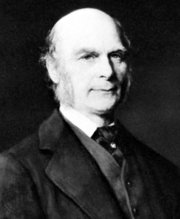Francis Galton
|
|
Sir Francis Galton (February 16, 1822 – January 17, 1911), inventor, explorer, statistician, anthropologist, a pioneer in eugenics, investigator of the human mind, and the founder of the science of measuring mental faculties: psychometrics. Galton was knighted in 1909. He was a Fellow of the Royal Society.
He was born into the Darwin-Wedgwood family near Sparkbrook, Birmingham and was Charles Darwin's half first cousin, his mother and Darwin's father having been children of Erasmus Darwin by separate marriages. His father was Samuel Tertius Galton, son of Samuel "John" Galton. He was advised at a young age by Charles Darwin that he ought to "read Mathematics like a house on fire," and was very much influenced by Darwin's ideas of natural selection when they came into print.
Galton had a somewhat directionless youth. Born into a family too wealthy to require him to work he took a gentlemanly rather than a professional interest in science and failed to graduate from Cambridge. In the 1850's he spent some time travelling in Africa and then proceeded to write books on his experiences including The Art of Travel, a handbook of practical advice for the Victorian on the move. The event that changed his life and gave him a direction was the publication by his cousin Charles of The Origin of Species in 1859. Galton was gripped by the work and devoted the rest of his life to exploring its implications. The result was a blizzard of discoveries and investigations as varied as detailed research into the perfect cup of tea and his discovery of the anti-cyclone. Galton would be the perfect exemplar of the batty Victorian scientist were it not for the, to modern eyes, rather sinister conclusions he drew from his cousin's work. Galton devised techniques such as composite photography in order to establish racial and social 'types' which could aid the management of society. He was a proponent of the idea of selective breeding amongst humans in order to halt what he saw as the decline of the British race. His ideas would go on to influence the sterilisation movements in countries such as Sweden, the United States and Germany. His work on eugenics was later adpoted by the Nazi party as a justification for the systematic elimination of the Jews and other races.
Histerionics, eugenics, statistics, correlation
His inquiries into the mind involved detailed recording of subjects' own explanations for whether and how their minds dealt with things such as mental imagery. Galton's 1869 work, Hereditary Genius, popularised historiometry and also formed the beginning of his thoughts on eugenics and heredity. (Galton invented the term eugenics). In statistics, Galton was the first to describe and explain the common phenomenon of regression toward the mean in the 1870s and 1880s. After examining forearm and height measurements, Galton introduced the concept of correlation in 1888. His statistical study of the probability of extinction of surnames led to the concept of Galton-Watson stochastic processes.
Galton invented the Quincunx, also known as the bean machine as a tool for demonstrating the law of error and the normal distribution. He also invented the questionnaire, regression analysis, composite photography (layering images upon one another to create what he considered a 'mean' image), the correlation, and twin studies. His statistical heir Karl Pearson, first holder of the Galton Chair of Eugenics at University College London, wrote a three-volume biography of Galton after his death.
Fingerprints
In a Royal Institution paper in 1888 and three books (1892, 1893 and 1895) Galton estimated the probability of two persons having the same fingerprint and studied the heritability and racial differences in fingerprints. Galton wrote about the technique (inadvertently sparking a controversy between Herschel and Faulds that was to last until 1917), identifying common pattern in fingerprints and devising a classification system that survives to this day. The method of identifying criminals by their fingerprints had been introduced in the 1860s by William Herschel in India, but their potential use in forensic work was first proposed by Dr Henry Faulds in 1880.
He also developed early theories of ranges of sound and hearing.
Aged 86, he died in Haslemere, Surrey.
External links
- Galton's published work (http://galton.org) (including all his major books and over 300 of his scientific papers)
The National Portrait Gallery has 6 portraits of Galton
- Search the collection (http://www.npg.org.uk/live/search/)de:Francis Galton
fr:Francis Galton it:Francis Galton he:פרנסיס גלטון nl:Francis Galton ja:フランシス・ゴルトン sk:Francis Galton sv:Francis Galton

